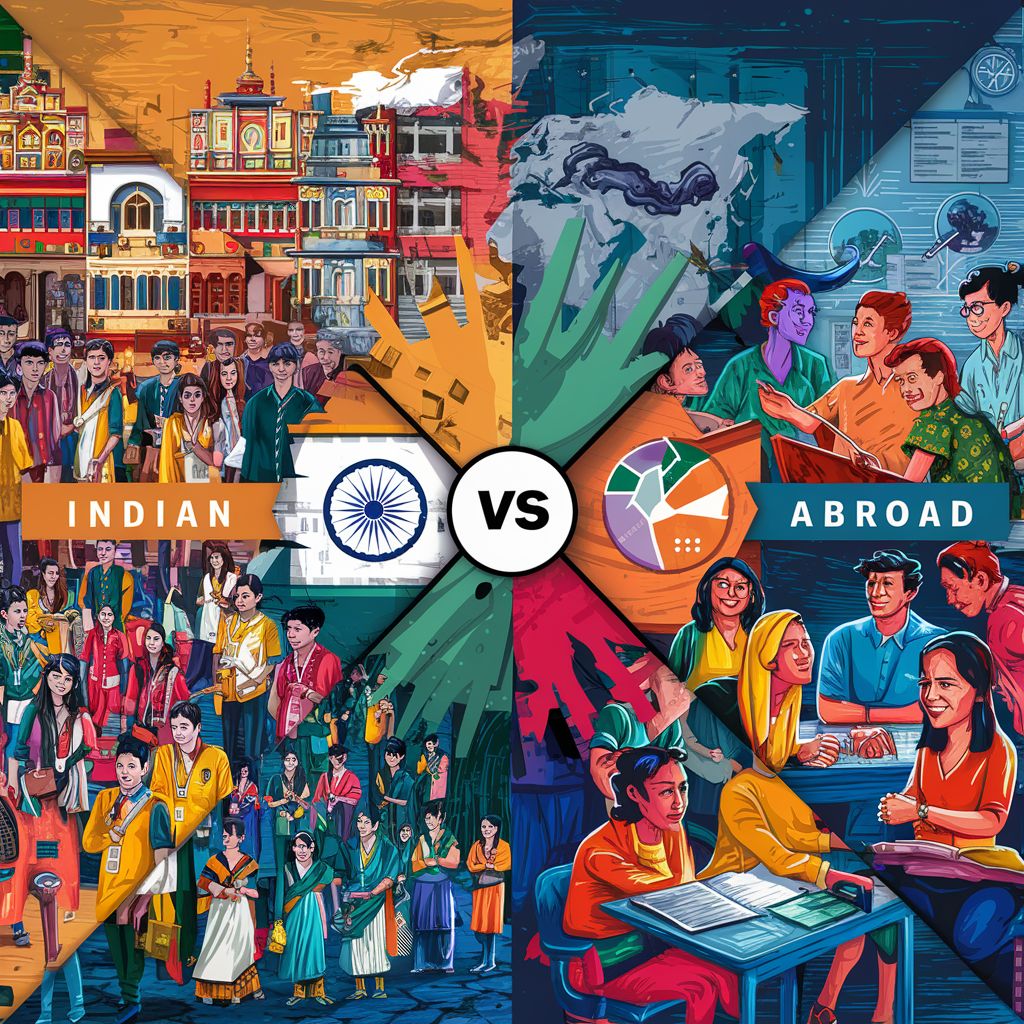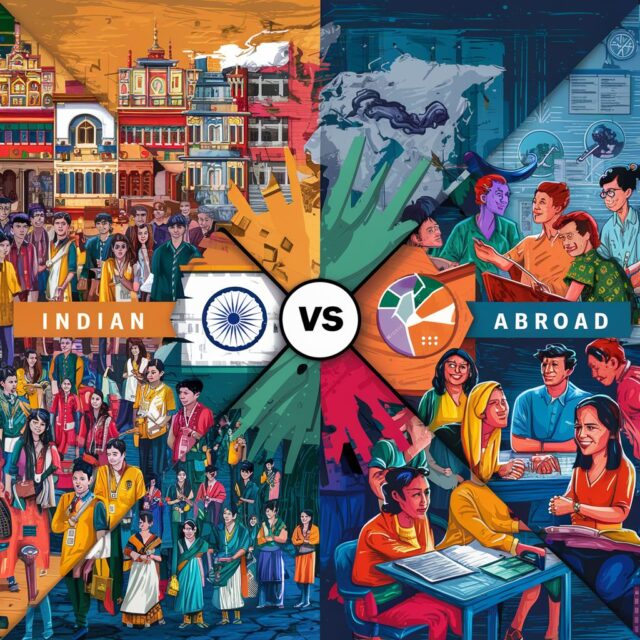
To many students, the choice of studying abroad or continuing their studies in India is an incommensurable experience which they encounter as they pursue an academic course. In each of these options there are own packs of perks and diebacks, therefore, the applicants need to be sufficiently conscious to make right choice at the most essential stage of their life. In this discourse, we will dive into the typical aspects of studying in abroad and studying in India, tracing the prospects , the encounters and the factors of both studying options .
Unlocking the Benefits: Study Abroad or India?
The choice of going on study abroad brings you many opportunities for personal development, cultural interaction, and academic proficiency. The acquisition of different cultural views and experiences from different cultures to be one of the foremost benefits from studying around the world. Students interacting with people from other cultures not only enables them to know about the diversity of issues in the world but also they get to learn the importance of proficiency in communication skills. Furthermore, the exchange of cultures within the international environment not only creates much needed networking opportunities with classmates, professors and professionals from one country to the other, thereby creating friendships that last a lifetime.
Cross-Cultural Experiences: Embracing Independence and Diversity
Besides the self-realization, academic excellence is a second motivation that makes students decide to go aboard. A lot of universities also possess top-notch research facilities which make these universities highly renowned worldwidely for their prestigious faculty and the innovative programs they offer. Besides studying in these institutions, learners will be on the grounds to tap on the top-rated resources and proficiency of an academic field that will finally turn the experience into a more enriching one and personalize their credentials. Besides, a lot of the time while you are abroad, you are actually adjusted to another language, which can greatly help to improve the level of proficiency and to open the way to new job opportunities.
Consequently, it provides a great platform for personal growth and an opportunity to be on your own. Studying overseas between lectures, students need to stretch boundaries, challenge their habits along with the ways of thinking and develop the ability to cope with new areas and conditions. This learning builds a strong mental character, a spirit of self-reliance, as well as an understanding of intercultural issues which in turn make you have a competitive edge in the globalized world. Besides, as if it is not enough, the exposure to different cultures, types of cuisines, and life styles opens minds and developments into more tolerant and open-hearted people.
In although of the fact that the studying abroad has a lot of considerable advantages it also accompanies some challenges which affect the student being abroad. The price of education and the possible financial burden are one of the top concerns for a lot of the students. It goes without saying that the tuition fees, various expense associated with living abroad, and travel costs are usually pretty high, and therefore, unaffordable for many individuals. Nevertheless, assistance in the form of grants, scholarships, and financial aid arrangements come as some measure of relief to deserving students with the same problems. Planning and budgeting costs are further critical skills for students because they will be able to apply them to their expenses more efficiently.
There are also a lot of problems that are caused by studying abroad such as change in an academic sytem and learning atmosphere. International students might get really confused with the teaching styles, grading system and academic expectations which could be uniquely exhibited in each different country. Nonetheless, students find it difficult to adapt to university life that is why universities arrange orientation programs, as well as academic and cultural integration services to facilitate the transition and student’s success.
In contrast, the India itself provides the other side of coin benefiting and improving students the various things. Of all the benfits, the cost-effective nature of education is the one that stands out. Unlike most Western counterparts, the cost of studying in India is generally more affordable and therefore presents a very good opportunity for students from different stages in the social-economic ladder. Besides that, the quality of education in India has been rising up for a long time, many universities and institutions have been internationally acclaimed because of their academic and research abilities that lead to the recognition of the country.
In addition, the stay of a student in India will enable them to integrate themselves fully in the deep-rooted Indian cultural heritage and the many traditions of India. In this matter, historical landmarks and festivals of India do exceptionally well to the education of the student beyond the classroom and also blossoms their inner culture. To put it in other words, the Indian domestic scenario is filled with internship, research project and career development opportunities because of country’s rapidly growing economy and emerging industries.
Moreover, Earning a degree in India makes it possible for international students to retain the ties of their family, community, and cultural origins. Being very close to home for many people brings them the comfort of being closer with their families, friends, and acquaintances who are often the pillars of support for one another especially when the time is difficult. Additionally studying in India encourages the students’ impact on development and progress of this country by deploying their skills, knowledge, and experience to solve social issues and facilitate a positive transformation.
But, India has its own draw backs which also limit the options of study there. It is especially then and there that the quality of infrastructure and resources in some schools appear. Although some universities in India are equipped with remarkable facilities and top professionals, others could just be short of the right infrastructure, equipment and necessary services, which might modify the student’s educational process. On the other hand, the complications associated with such procedures like, the bureaucratic delays, the administrative red tape and so forth, are the factors that most of Indian students complaint about. It is like a huge hurdle in their way to education.
To sum up, that is if you are in a query to either do study abroad or study in India, needs some factors need to be taken into account, considering the academic goals, financial issues, likes and personal attitudes and cultural principles. Granted, both decisions, however, are associated with varied academic and personal development possibilities in tandem with challenges that one has to overcome. Eventually, the choice of high school might be one of the most important decisions in your life and, therefore, it is of vital significance to think your priorities through and make an informed choice after you take your dreams and values into account. Moreover, whether it is an overseas study or native country study, knowledge pursuit is supposed to be a critical and transformational mission that actually directed the society as well as the individual.












